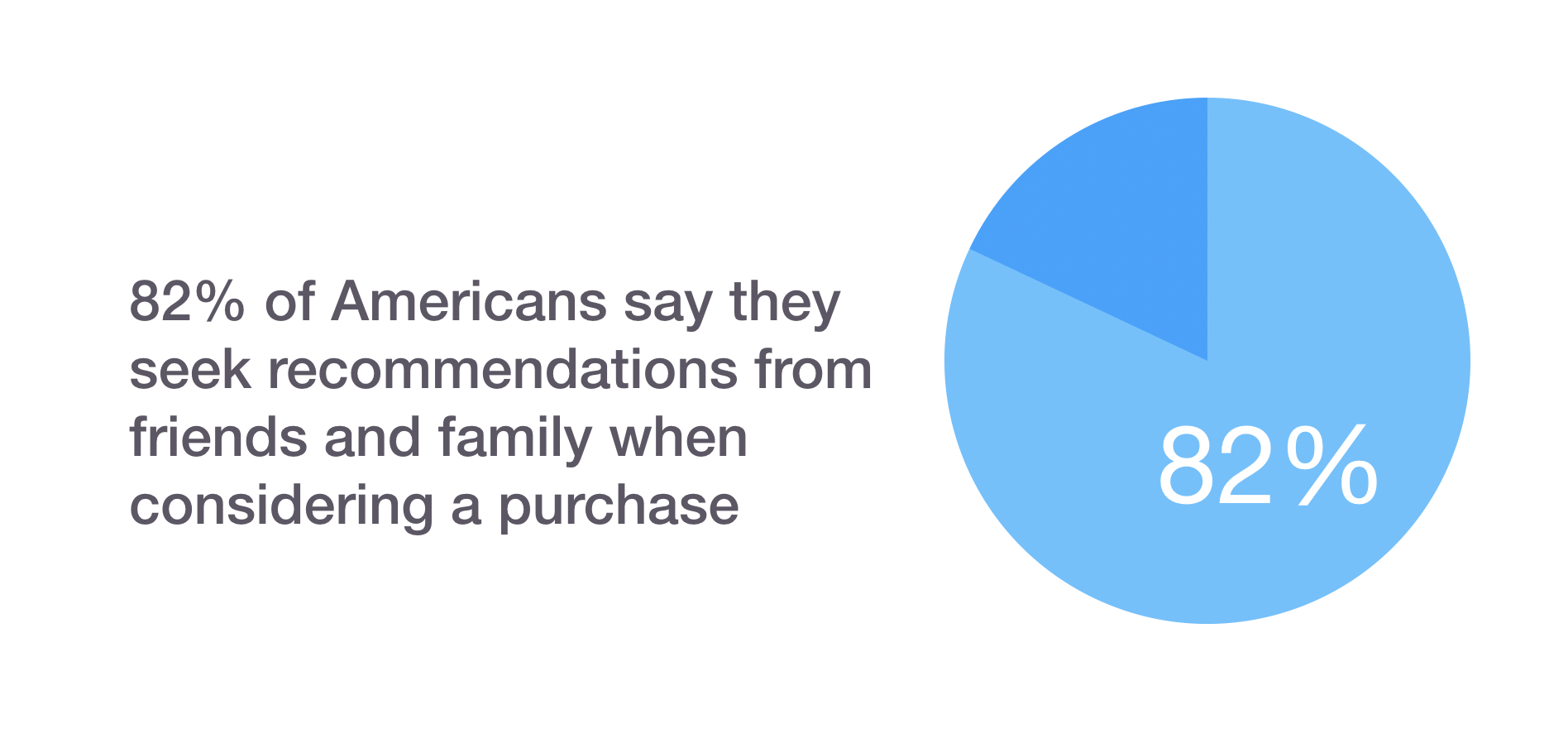Share this guide:
About the Author
Hey guys, it's Eric Johnson.
I've worked with more than 100,000 network marketers helping them be more successful.
I'm also the founder of Teamzy CRM, a platform designed for Network Marketers to build their business.
More than likely, you chose this business because you believe in it; you’ve experienced amazing results and you’re excited to share it with others to help them improve their lives as well.
You may have been drawn to being your own boss, whether it’s your side gig to earn extra money, you’re a stay-at-home parent wanting to supplement the family income or you’re a budding entrepreneur who wants to build a successful network marketing business and escape the typical nine to five job.
Whatever your reason, your excitement is likely dampened when you have to engage in tra- ditional sales methods that leave you feeling dirty and frustrated.
Think about why you sell your product or service
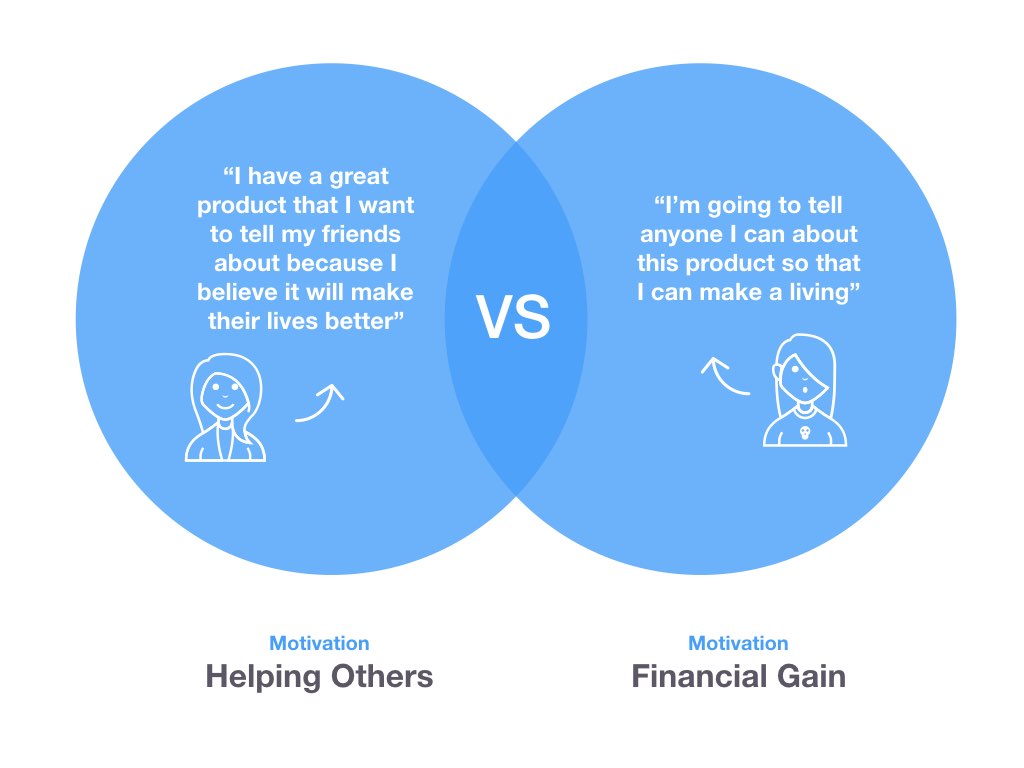
Although you may love making sales, you likely hate sounding ‘salesy.’ Perhaps you were told that in order to achieve your sales goals, you had to rely on icky traditional sales methods, such as cold messaging and calling friends and family or purchasing leads online.
The problem with that is by a few calls in, you begin to feel rejected as you hear ‘no’ after ‘no.’
However, you were likely told that ‘no’ is a badge of honor and the more you hear it, the closer you’ll be to making a sale. This isn’t why you got into this business, is it? If you have the heart to serve others, traditional sales and marketing strategies can leave you frustrated. There's a better way to build a network marketing business.
How to Use this Guide
This is more than a guide to succeed in Network Marketing or MLM; it will help you leverage your heart to help your family, friends and other social connects fulfill their needs and goals while also meeting your sales and business goals as well.
In these pages, I'll introduce you to Relationship Marketing, which will help you:
Generate new customers and recruits
Build relationships and transition to a sale
Follow-up and close more sales
Most importantly, you’ll learn why having the heart to help others will help you generate more business!
What is Relationship Marketing?
Chapter 1
Relationship marketing is a lead generation system: a system that initiates consumer interest or inquiry into the products or services of a business.
It’s about maintaining consistent contact with your clients so you can provide information about products and services that align with their needs, goals and lifestyle.
Instead of being seen as a salesperson, you’re the go-to person your customers rely upon with the solution to their challenge.
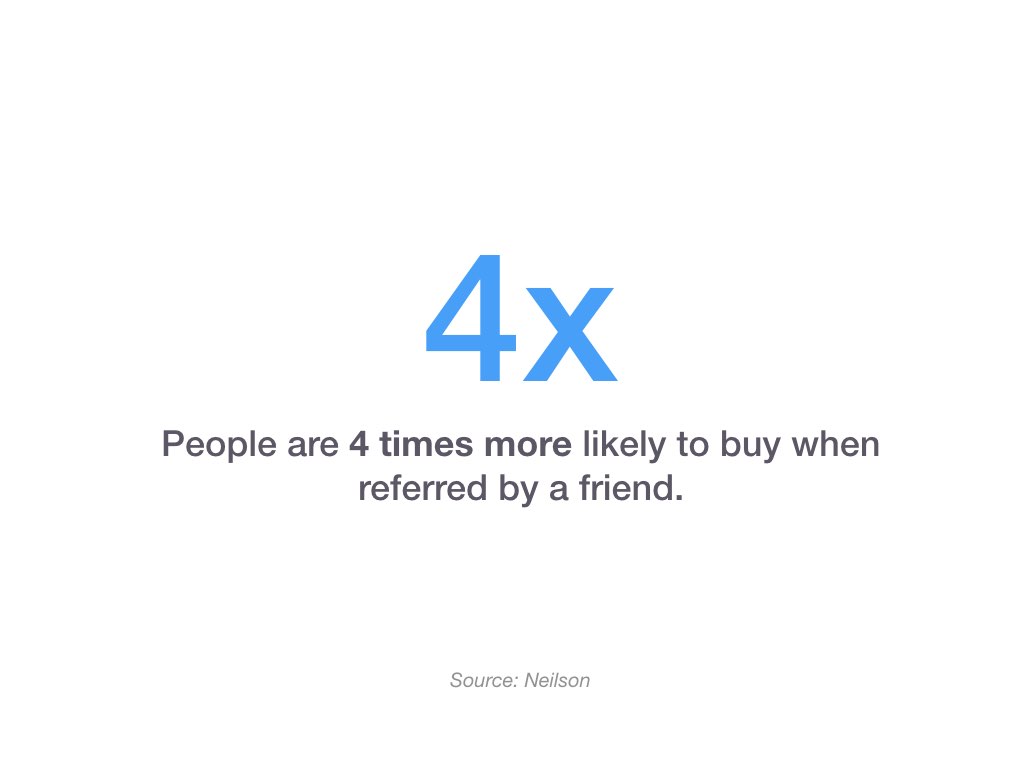
Source: Nielsen
Relationships are your duty
The main difference between relationship marketing and the traditional approach to this business is the underlying philosophy that developing and deepening relationships is the paramount duty of a business.
In order to succeed at relationship marketing, it must be in your heart to help others, whether they’re current relationships or their connections.
When you seek to serve first, the more your clients, team and those in your upline and downline will trust you and become loyal advocates.
3 Principles of Relationship Marketing
Seek to serve first, bring value and invest in the relationship.
by investing in relationships, people are much more likely to do business with us and to recommend their friends and family.
Ensure your motivation is to help, rather than financial gain.
As you connect with your clients and look for ways to help, you’ll build trust and develop your relationships with them. As a result, they may begin recommending you to others.
Focus on building advocates rather than customers
So they become walking, talking billboards for your business. You’re not selling products to relationships. You’re investing time and providing excellent service so you can turn prospects into advocates.
But, don’t run over your relationships
With the traditional marketing approach, you’re encouraged to blast your relationships with cold messages and invites, hoping to take advantage of the existing relationship to get a sale.
You’ve probably received these invitations from distant relatives or classmates you haven’t seen in years or you’re guilty of sending a few yourself.
In relationship marketing, your goal is to nurture and develop your relationships and become their go-to expert.
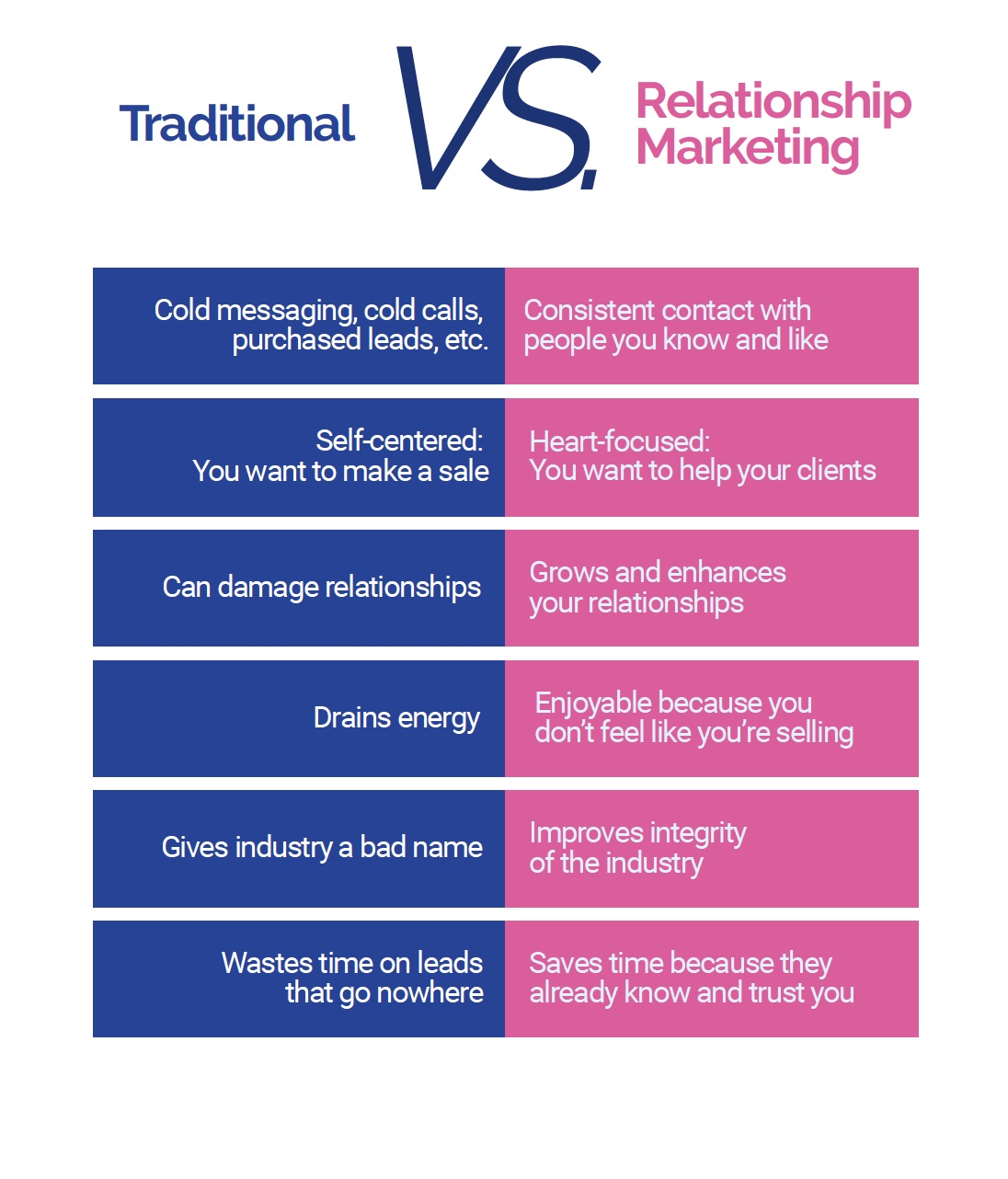
Further, people are four times more likely to buy when referred by a friend. If buyers are leaning heavily upon the people they trust to help them make purchasing decisions, why are so many people wasting time with traditional marketing methods?
It’s far more enjoyable to connect with people you know and like and help them meet their wants and needs!
Create Advocates = Generate Referrals
The more you invest in your relationships, the more likely they are to introduce you to people they know.
The best part is the people they introduce will already trust you because their friend does.
More than 85% of new business comes from customer word-of-mouth.
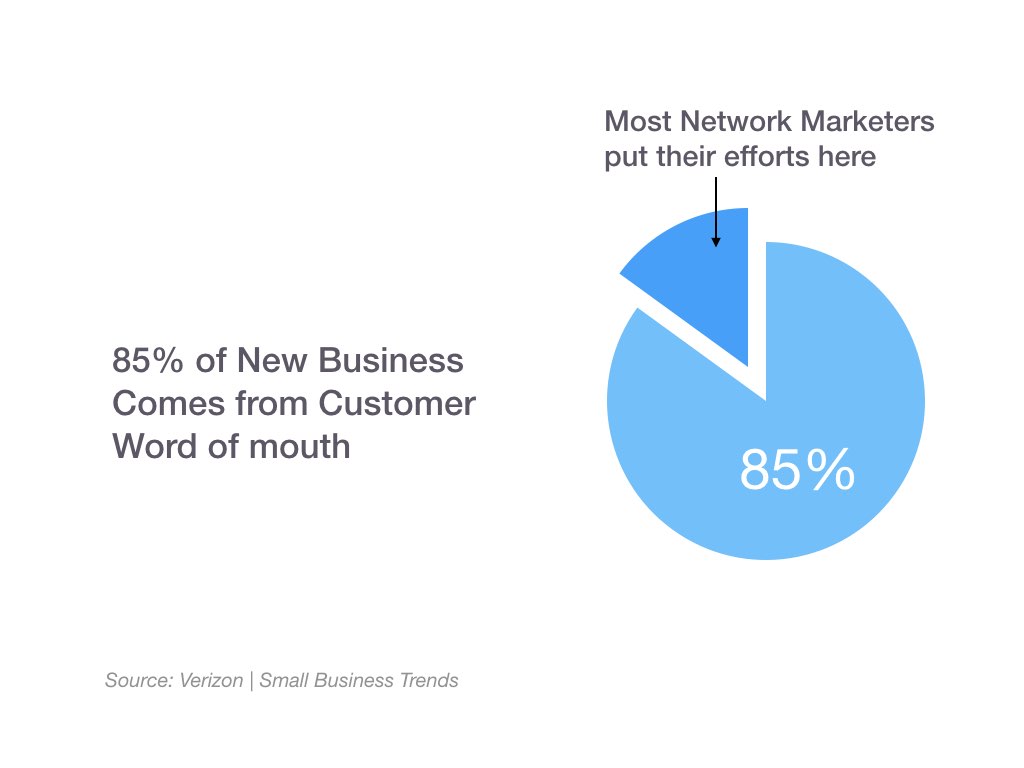
Source: Verizon | Small Business Trends
Instead of starting business from scratch, you’ll build in the relationships you already have.
Who would you rather work with?
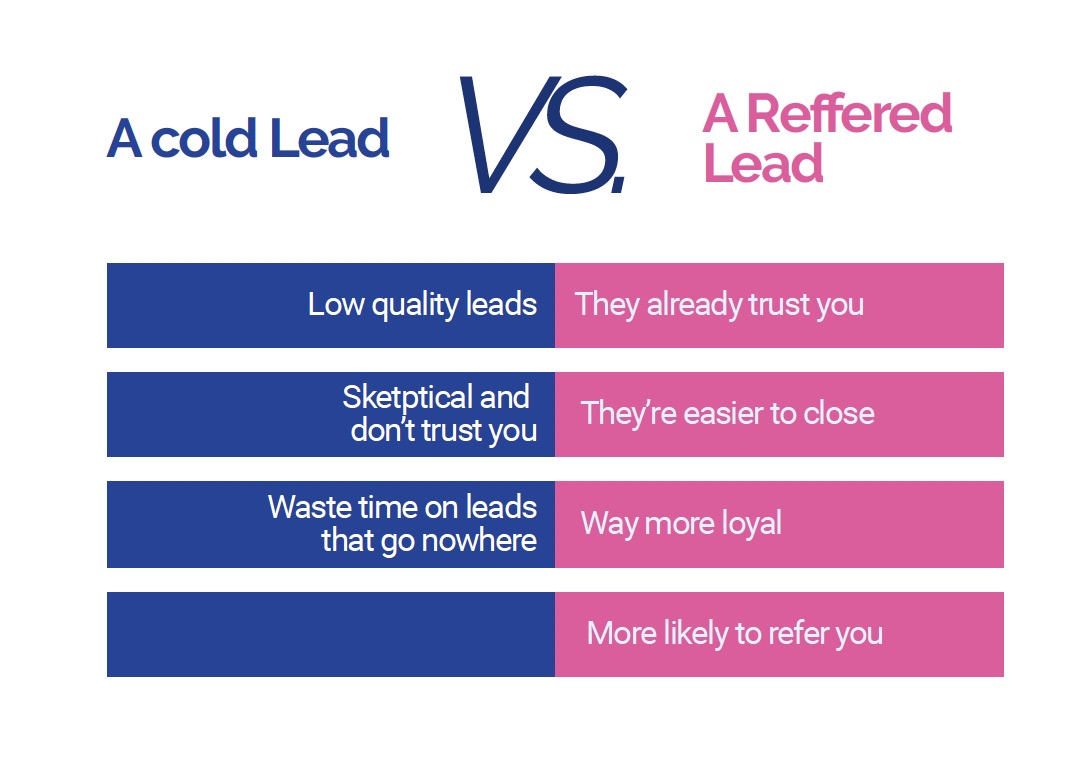
It’s clear—relationship marketing not only makes the most sense because it taps into your heart to serve, it’s also easier and more fun to generate more business.
Trust is Everything
Chapter 2
Trust is not only central to relationship marketing, it’s the most important component of our relationships as well. It makes the work fun because you don’t have to convince them; you can jump right in helping them find solutions for their needs and wants.
Trust also makes the sales process less icky-feeling and you can go for ‘yes’ right away! Building trust takes time, especially if the connection is new. The good news is, every time you reach out and connect with someone, you have the opportunity to develop trust.
How to Build Trust
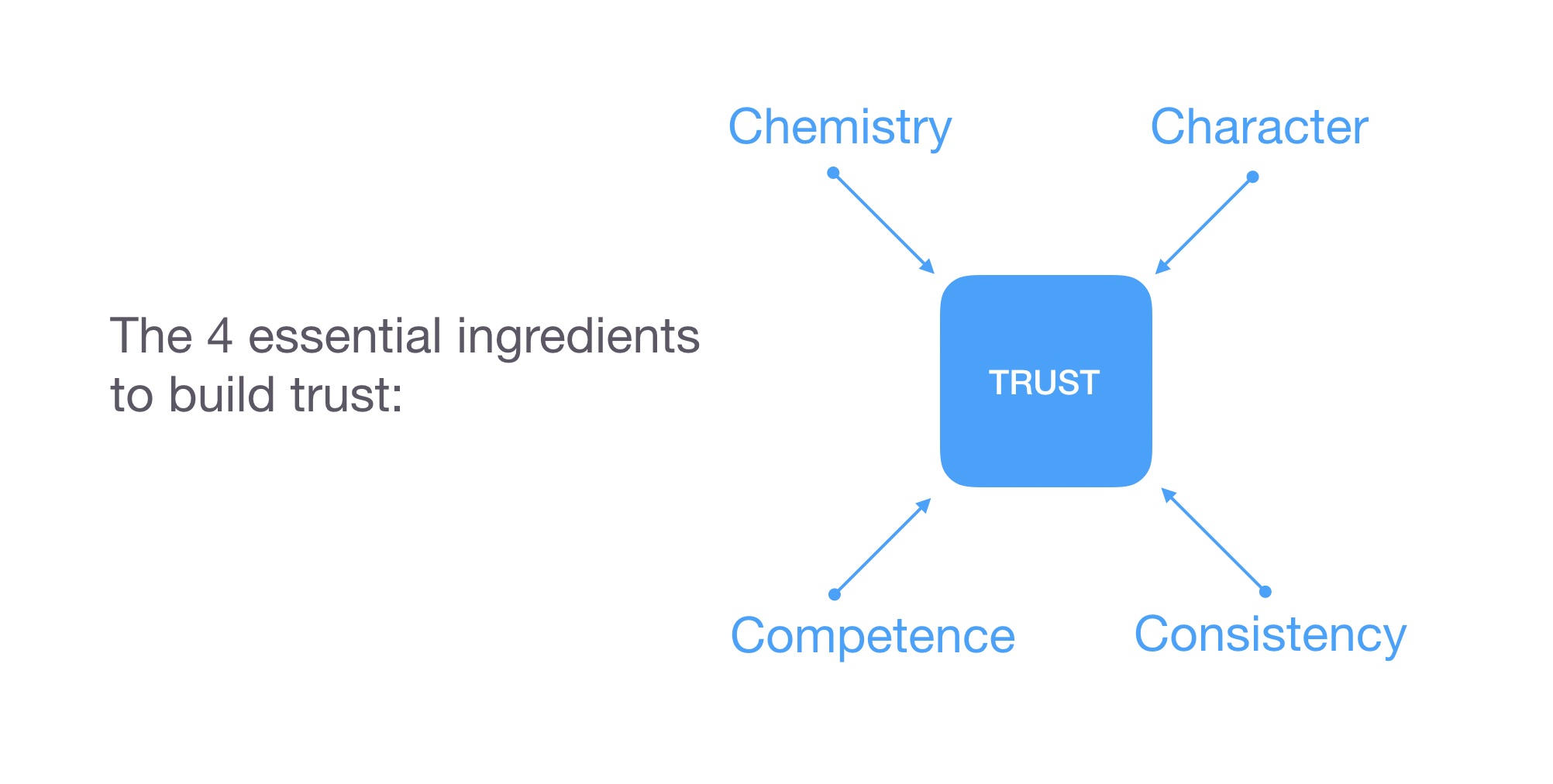
There are four ways to develop trust with the people we know and care about, or who we hope to get to know better.
Think about the relationships in your life, from your family and friends to the trusted professionals you turn to products and services: the trust you’ve developed with them falls into one or more of these four categories.
1. Chemistry
Chemistry is the common ground you share with people, including your clients, prospects and team.
It’s that spark you feel with someone that tells you you’re part of the same tribe and relate to one another. What is it about you that people can relate to?
2. Character
Character is demonstrating how much you care and that you’re relatable. While it may be influenced by your values and beliefs, the central tenet of character is your actions.
Character isn’t something you have; it’s something you do, including your actions, words and how you make others feel.
3. Competence
Competence is demonstrating you’re good at what you do and you’re a business person. It’s knowing your products and services, inside and out, and confidently sharing your expertise with others.
Your customers know you sell a product, but they need to be confident that you know enough about it to help them. If you’re selling nutrition and fitness products, become an expert in health and wellness.
If you’re selling skincare products, learn all you can about the beauty industry. Whatever your product or service, strive to improve your expertise in that industry so you can share your knowledge and insight and help more people.
Additionally, your customers want to be sure that when they’re ready to sell the products themselves, you have the knowledge and expertise to mentor them.
They need to see you demonstrate that you know what you’re doing. Competence may be difficult to prove when you’re new to the business. The old adage “fake it until you make it” doesn’t apply in relationship marketing; in fact, faking it will damage the trust you’ve built with your customers. Lean into your team and tap into their expertise.
Say, “I don’t have the answer right now, but let me ask a few experts on my team and I’ll get back to you in a few minutes.” It’s okay to not know everything; it’s not okay to lie about it.
4. Consistency
Consistency is doing the activities that deepen relationships on a regular basis so that your customers begin to depend on it.
It’s the most effective way to build trust as it shows that people can rely on you; they know you’ll do what you say you’re going to do.
If you say you’ll send them information that’ll help them with a problem they mentioned, you’ll send it and follow-up with them. If you say you’ll message them next week to check-in, you will.
People won’t believe you until they see you.
Posting on Facebook or Instagram can help you build trust faster with your favorite customers, prospects, and team members.
Before moving on, ask yourself two questions...
- Are you consistent?
- Are you a product of the product you sell?
- Are you sharing your journey with others?
- Are you consistently in touch with your relationships?
If you answered “no” to question one, consistency is an area to focus on going forward to help you build trust with people you are trying to help. If your answer to question two was no, this is your wake up call! The only way you can build and deepen relationships with your team, clients, and prospects is to consistently connect with them.
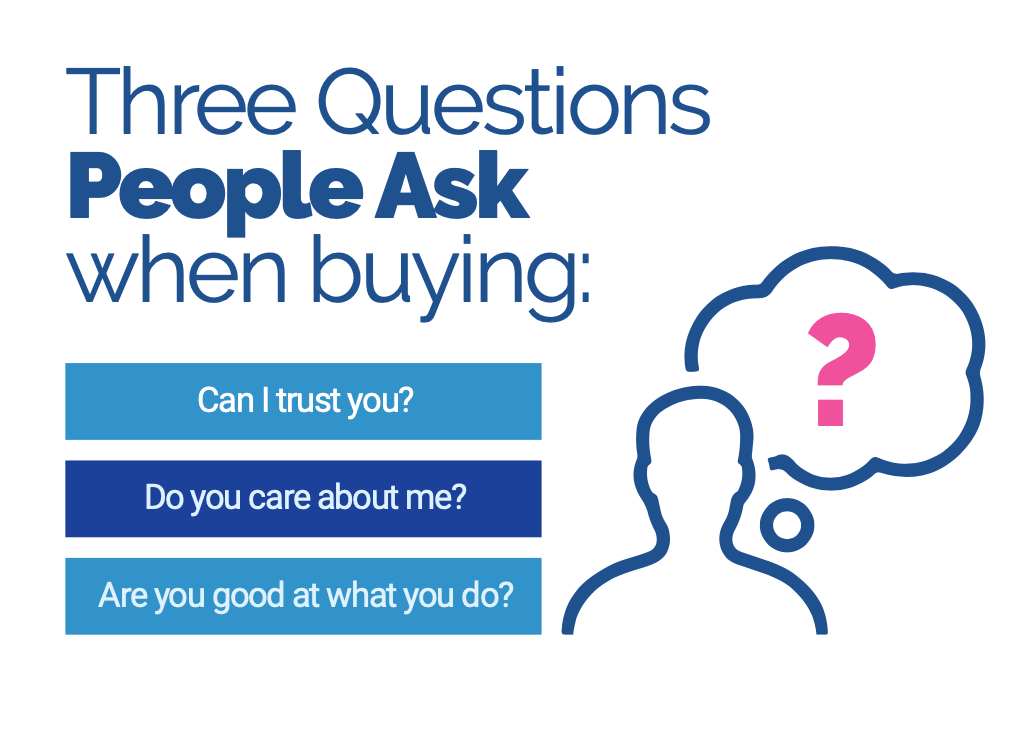
Relationship building is a contact sport
Regular contact is essential to growing and deepening relationship. By investing time in your relationships, you can make sure that each time you contact them, you’ll truly connect. Investing time and connecting with people is the only way to deepen relationships and building relationships is what leads to building a successful MLM network marketing business.
Get personal
When you connect with people, make it personal. When you text, email or send a Facebook message, make it personal. Ask how their daughter is enjoying soccer camp or if they mentioned they just returned from vacation, ask where they went. Asking questions allows you to get to know them better and show you care, both of which further enhances your relationship with them.
When birthdays, anniversaries and other special events roll around, send them a card and handwrite a personal message. It’s true, writing a note takes time, but that’s what makes it so valuable. People feel special because you took the time to write them a message.
Get Your List Organized & Prioritized
Chapter 3
It’s impossible to be productive when you’re feeling scattered. If you’re like many people, you probably have information about your clients saved in many places spreadsheets, notebooks, your smartphone, random scraps of paper pinned to a corkboard.
Additionally, you may also have to-dos scattered throughout your digital and real-life workspaces as well. Instead of spending time connecting with your clients, you’re spending time trying to find that slip of paper with a prospective client’s phone number on it (you could’ve sworn you left it on the fridge...). You’ll never have the information you need when you need it.
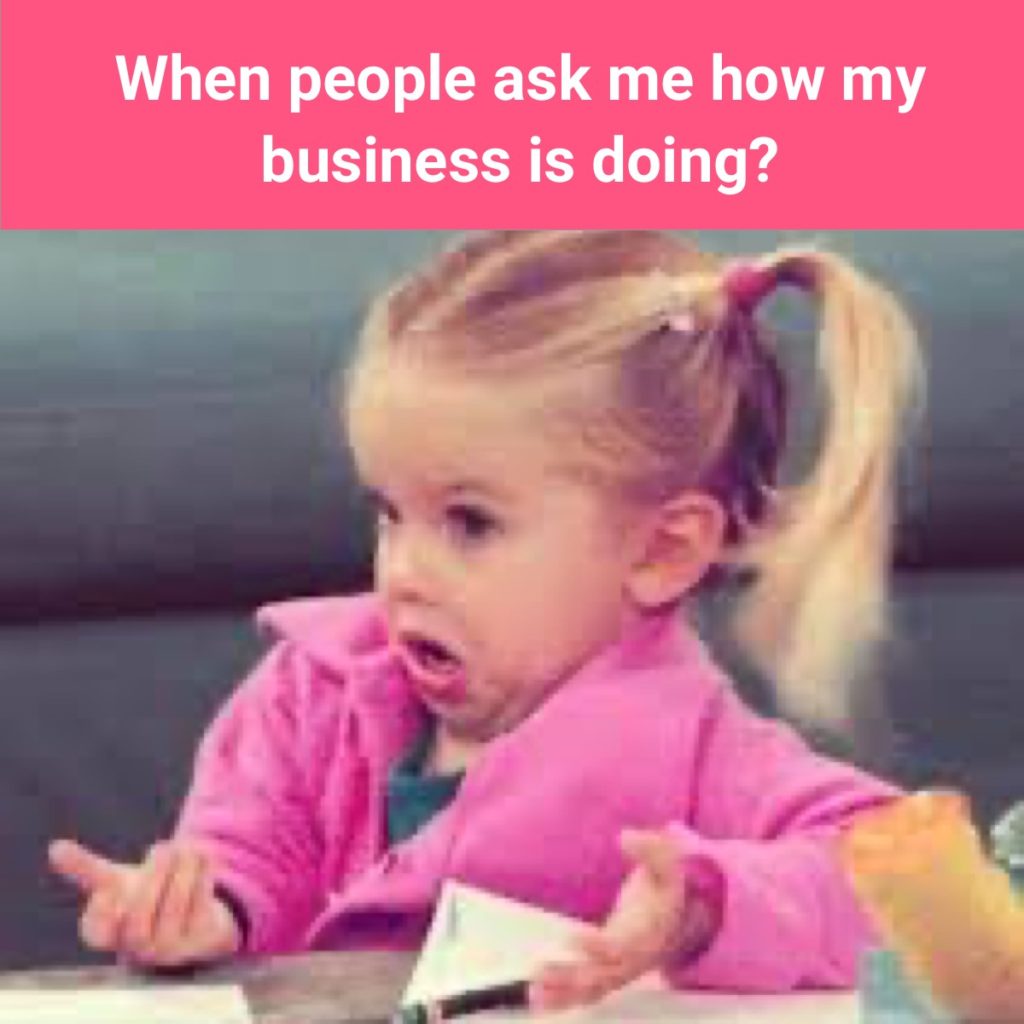
Get organized once and for all
Although this step may take some time initially, it’ll begin to save you a lot of time right away.
1. Have one list with ALL of your contacts
Collect all of the contact information you have for your clients, prospects, team, distributors and other connections and store it in a single list...
2. Have a system to help you leverage your time.
Time is a precious resource. A system allows you to use it wisely so that you’re connecting with the right people at the right time and in the right way. No more wasting time wondering what you need to do next; a system keeps you on track.
3. Use a Customer Relationship Management (CRM) program
A CRM is the most important software tool you have at your disposal. It’ll not only organize all of your contacts’ information, but it’ll also help you run your business efficiently. (Of course, I recommend Teamzy)
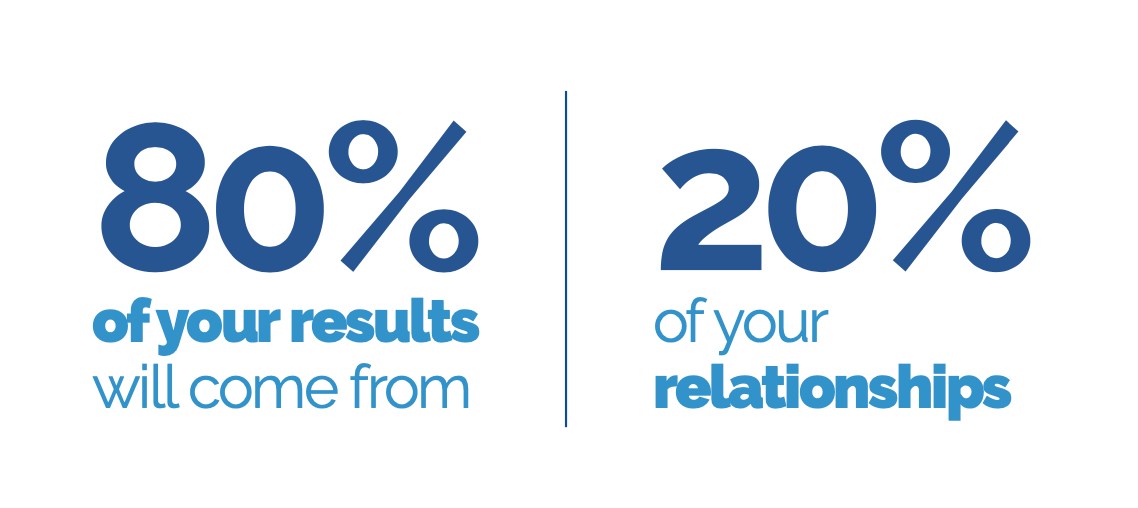
Since the majority of your sales will come from a small percentage of your connections, it only makes sense to spend the most time with them.
That doesn’t mean you ignore everyone else; it just means you contact your best people more often.
How do you know who your top 20% of relationships are? Prioritize! Then, you’ll connect most often with your best people. This is where your list with all of your contacts comes in. Go through your list and assign them a star rating.
The 5-Star System
★★★★★
Your best friends and closest family members. The people you feel are most likely to become a customer or join your team. Or an existing customer or team member who is a rockstar! (Hot)
Contact them every 30 days.
★★★★
Friends and family or relationships you feel might become customers or team members with a little nurturing. An existing customer or recruit who is a consistent performer. (Warm)
Contact them every 60 days.
★★★
Someone you know who might become a customer or recruit at some point in the future or existing that shows interest occasionally. (Neutral)
Contact them every 90 days.
★★
Someone who may or may not become a customer or coach at some point in the future. (Cold)
Contact them every 120 days.
★
Someone you don’t want to market to. (Frozen)
Although you’ll never reach out to them proactively, you may want to hang on their information.
The process shouldn’t take very long, depending on your number of contacts. It’s easier if you have a system in place to help with the process. Of course, I recommend Teamzy CRM. to help you with organizing contacts and growing your MLM network marketing business.
Starting Conversations
Chapter 4
One of the biggest roadblocks of traditional selling strategies is starting a conversation with someone you don’t know. You know nothing about them, other than a name, so it’s difficult to find the common ground to initiate a conversation.

Cold invites end conversations and often end friendships
Cold selling just isn’t effective, especially if you value your relationships. The approach is self-centered because it only focuses on what you get out of the deal, not how it can help the other person.
As a result, it can damage your relationship because it makes the other person feel as if they’re not as important to you as getting a sale. And finally, the approach gives the entire industry a bad reputation; people may have the urge to run for the hills when they hear a family member or friend is (gasp) selling something.
3 tips for starting conversations
Connecting with your contacts may be easy once you get the conversation started; the hard part is thinking of what to say to get there. Keep the three things in mind as you begin to connect.
1. Develop a make-someone’s-day mindset.
The ultimate goal of reaching out to your relationships is to connect. You want to put a smile on their face so they enjoy hearing from you!
2. Set daily goals and hit it consistently.
For example, your goals may look like this:
- 10 prospects
- 6 customers
- 4 distributors
That’s only 20 people per day to connect with. That’s 20 smiles to make!
And it’ll only take about 30 minutes to do. That’s not so hard, is it? The key is to stay consistent and meet your goal every day.
3. Don’t get stuck in analysis paralysis...
Avoid staring at your screen for 20 minutes, trying to think of THE PERFECT thing to say.
Keep it simple.
Hi Jay! Just stopping by to say hello. How are you? I hope your day is awesome! 😃
Have scripts nearby to help you get started.
Use them word-for-word or let them inspire you to write your own message.
Hi Jane! It's been a while since I checked in with you. How are you? I hope all is going great!
Use Facebook Messenger or text whenever possible.
Most people avoid phone calls and may not bother to check voicemail. Since the response rate of Facebook Messenger is 99% across the board, it’s the most efficient way to connect with your contacts..
Hi Jay! I saw you cross my Facebook Feed and thought I'd say hello. How are you? I hope your day is awesome! 😃
So, how can you keep the conversation going?
Ask the right questions! “What are the right questions,” you may be asking? They should follow the F.O.R.M format.
Why consistent contact matters
After connecting with your relationships, your second focus is to do it consistently, using the 5-Star System as a guide.
For example, you’ll check in with your 5-Star folks once a month, your 4-Stars every other month, etc. If you want to build relationships and achieve your goals, consistency is the most important to your business.
Three Reasons to stay in consistent contact with customers
So they think of you as the expert.
They will buy more products and stay on recurring orders longer.
They will bring new people to your business.
Remember, connecting with customers and distributors on your team is equally important as connecting with new prospects! Connect with them individually to build and deepen your relationships with them.
Bringing Up Your Business When Appropriate
Chapter 5
Isn’t business more fun when you can help the great people you know?
While it’s tempting to invite all of your favorite people into the fold right away, waiting for the appropriate opportunity truly pays off.

How to appropriately share your products or busines opportunity
Ask Questions.
As with any relationship, you’ll want to get to know contacts better to make sure they’re the right fit. Even if you grew up together, there’s still so much more to know.
When you connect with them, ask questions that provide insight into their lives and motivations. A simple “What have you been up to lately?” will get the conversation started; just be sure to ask open-ended questions that keep the conversation going.
Identify wants and needs first.
During the course of the conversation, they may reveal insight into what they want and need. Even if they don’t say so directly, they’ll often offer clues. You Ask:
What have you been up to lately?
Response #1: Busy working. I love what I do!
Response #2: Working. I dread it. I hate my boss.
Both of these situations provides dramatically different opportuni- ties, which leads to...
Invite them into a solution for their problems (by sharing your product/opportunity)
It’s clear that you likely won’t recruit the contact of Response #1 any time soon. However, they may become one of your best customers and recommend you to the people they know.
Response #2 reveals the person may be open to new opportunities. You may respond back to them:
I can relate. That’s why I feel so blessed to be able to help others and be home with my family. I don’t have to answer to a boss.
This allows you to talk about your business in a natural way while hitting on some of their pain points. Then, invite them into a solution by saying...
You know, you’d probably be really good at this.
3 tips for successful shares
Follow Up
After the share, add them to your follow-ups list. Don’t let great potential recruits fall through the cracks! When you add them to your list, you can remember to follow-up.
Reconnect
Reconnect with contacts who aren’t ready yet. Follow-up with them at a later date, based on their Star rating you gave them earlier.
Track it all
Keep track of all invites and follow-up in your CRM. Not only will you know who to follow-up with when it’s appropriate, but you can also keep track of your progress toward your daily goals. If making 20 connects each day seems overwhelming at first, rest assured that it’ll likely only take about 30 minutes of your time.
Daily Goals
Your goal should be 3 shares
3 out of 20 conversations gets a share, and are added to your follow up list.
Here's what your week looks like:
Prospects
10 Connections
Customers
6 Connections
Team Members
4 Connections
20 Connections Total
By friday, you’ll have 15 people on your follow-ups list!
Remember, you’re providing a valuable solution to their problem. While they may not respond initially, they’re likely to increase their enthusiasm as you follow-up and you build your relationship with them.
Do all this and more in less than an hour a day
Teamzy tracks all your connections, follow-ups and income-producing activities for your network marketing business. In fact, we designed it to be done in less than an hour a day, which we call a power hour.
Following up Like Pro
Chapter 6
80% of all sales happen between the 7th & 10th follow up
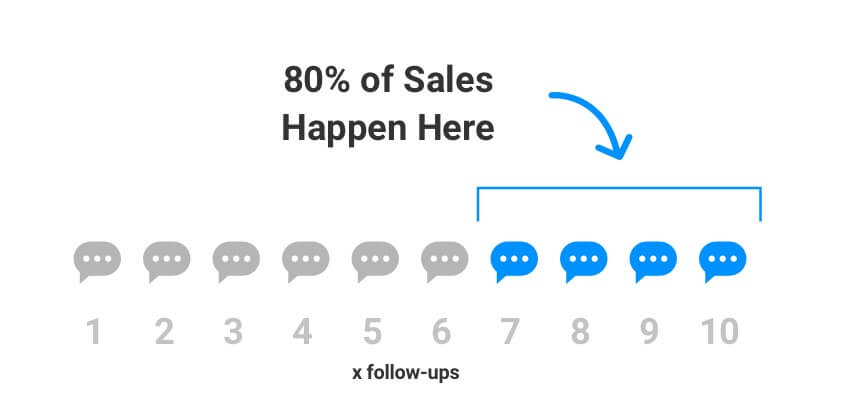
Are you following up 10 times?
Most salespeople don’t.
They may follow-up three times, but if they don’t hear anything, they begin thinking up stories as to why the other person isn’t responding.
The stories become more and more dramatic as times goes on until the salesperson is cursing the person, their family and saying they never really liked them anyway.

In reality, most people won’t respond to the first five follow-ups. The reason is simple: it takes time for people to stop seeing you and the opportunity you’re offering as a threat. The threat is change. Change is scary and their subconscious mind will shut it down.
After several more follow-ups, they’ll connect to the hope of the original opportunity. By the time they get the sixth or seventh follow-up, they may respond and say “I’m so sorry! I’ve been busy with [work, school, family]. Thank you so much for following up!”
At this point, they’re more likely to have their defenses down and will be open to talking about it with you. That’s why by your sixth or seventh follow-up, you’re technically starting over.
Stay positive during the follow-up process
One of the reasons network marketers avoid following up is they don’t want to seem annoying and drive away potential business or recruits.
Waiting to hear back may feel lonely at times. However, there are three questions to ask to help you keep your chin up and motivated to continue reaching out to your contacts.
- Do you believe in your product?
- Do you believe in your opportunity?
- Are you in the business to change lives?
If your answer is “Yes” to these questions, it’s time for a shift.
Shift your mindset—Following up is an act of love!
Since you care about your relationships, following up is your chance to show them how much you care.
It’s an opportunity to gain trust and practice the 4 Cs discussed earlier - Chemistry, Character, Competence and Consistency. Ensure you’re following up with the right people at the right time by following a system so no one falls through the cracks.
How to follow-up without being annoying
Never ask them to do anything in your follow-up.
The last thing you want is to make them feel like you’re giving them work. Instead, ask how they’re doing, send well-wishes for a great day, etc.
Keep your follow-up short, sweet and written.
When you receive a text or message from Facebook Messenger, isn’t it easier to read the message without having to open the entire message on your phone? Your contacts feel the same way. Target your follow-up messages the same way.
Create Introductions (aka Getting Referrals)
Chapter 7
We mentioned earlier that 82% of people get recommendations from friends and family before they buy.
We also mentioned earlier that 85% of new business comes from customer word-of-mouth.
People love to recommend products and services they use and enjoy telling everyone they know.
Don’t get referred; get introduced
The key to getting new business is to have your relationships introduce you. There’s a difference between introductions and referrals.
While introductions are proactive (e.g., your contact is connecting you to someone via text, email or Facebook Messenger), referrals are passive. Once you ask for a referral, you may be waiting a long time before your contact comes through with one.
Who will introduce you to new customers?
#1 Your Advocates
Your advocates are the people who will shout praise about your products and business from the rooftops! When they hear someone talking about your industry, you’re immediately the first person that comes to mind. They’ll gladly introduce you to people they know who could benefit from your products as well.
As you connect with them, always plant seeds. Over time, people will introduce you to their family, friends and other contacts.
Plant the seeds for an introduction.
Be sure to ask to be introduced by email, text or Facebook Messenger!
Could you do me a favor? If you come across anyone you care about that might need help with [whatever it is you help with], would you connect them with me so I can send them some information?
#2 Your Current Customers
The hottest source of new leads is a current customer. Why? They not only use and love your products, but they’re also likely talking about them (and your business) already with their family and friends. Plus, they trust you and know you’ll take care of the people they introduce to you. Your customers already have people who are ready to buy right now; what are you waiting for?
How to get introduced
I know you’ve been really enjoying [the product]. Can you think of anyone you care about that might be interested in learning more about [the product]?
If they mention a name or two:
Great! Would you mind quickly introducing them to me so I can get them some information?
Be sure to ask to be introduced by email, text or Facebook Messenger!
The benefits of relationships marketing extend to your team!
When you lead with your heart and your team is sure to follow. Don’t be surprised when your team begins to imitate your relationship selling style.
Use the opportunity to mentor them along the way. Additionally, you’ll attract trustworthy, caring people to your team who have the heart to serve as well.
They’re more likely to stay aboard too because they know you’d never ask them to do something you don’t believe yourself. What could be better than growing your business and your team as you continue to connect with great people you know and life?
Action Steps
Stay in Consistent Contact
With your advocates and customers, and always plant seeds.
Ask them to introduce you
Follow up like a pro

